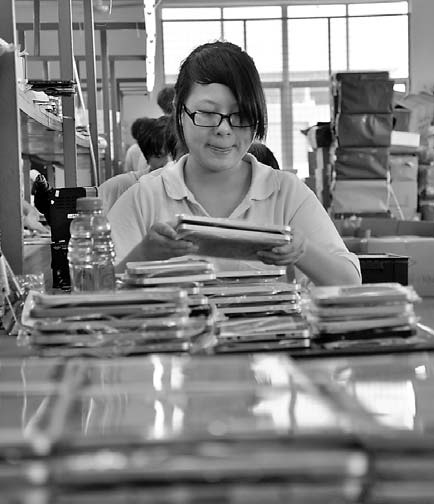| Radiology Room |
| Ultrasound Room |
| Surgery Room |
| Laboratory Room |
| Comprehensive Room |
| Pediatrics Room |
| Dental Room |
| Medical operation instruments |
| Hospital Furniture |
| Medical supplies |
News Center
The rise of the no names
|
Producing tablets at lower prices is the key to commercial success, electronics manufacturers in Shenzhen say. [Photo by Zhao Yanrong / China Daily] |
When Steve Jobs resigned on Aug 25 as CEO of Apple Inc, many of his worshippers in China thanked him for the changes he brought to the tech world and to people's livelihood. One special group was the small manufacturers and vendors of tablet PCs in Shenzhen, the electronics center of China, whose businesses were saved by Apple's iPads.
Before entering the tablet PC industry, Shenzhen Easydy Electronic Technology Co Ltd made netbooks, an Internet-ready device that had fewer complex functions. That was five years ago, when the high-tech industry in Shenzhen believed the small and light mobile devices would replace laptop computers.
Two years after their major push to manufacture netbooks, the market for the fad had fallen.
But all that changed when the iPad was launched in April 2010. Companies in Shenzhen started immediately making and shipping tablet PCs overseas.
"Even though the iPad dominates the tablet PC market, I am sure 99 percent of the digital companies in Shenzhen appreciate Jobs, who created a huge market demand for us," says Wen Feng, general manager of Easydy.
But in light of the recent news that cables obtained by WikiLeaks showed Apple was concerned about counterfeiting in China and set up a security team to tackle the issue, most manufacturers in Shenzhen are under fire from the high tech-industry.
Many Shenzhen manufacturers say they are just making tablet PCs, not fake Apple products. They say their products use Google's Android software and do not carry an established company's logo.
For these manufacturers in Shenzhen, tablet PCs are made up of no more than a shell, a PC motherboard, a screen and a battery, which is easier than making any other digital products.
"Just one month after the iPad was first launched, 60 percent of China's netbook manufacturers and many of its portable media player suppliers started rolling out tablet PCs as cost-effective alternatives," says Livia Yip, publisher of a report on the tablet PC industry.
Shipments of white-box tablet PCs grew more than 230 percent from 567,000 units in the last quarter of 2010 to 1.9 million units in the first quarter this year, says DisplaySearch in a report in June.
China represented the largest market for white-box tablet PCs, accounting for 44 percent of global shipments.
The market for iPads in China dropped 5.14 percent in the second quarter of this year, according to Analysys International, an Internet information company.
"If 2010 is the first year of the tablet-PC era, 2011 must be the start of Chinese white-box tablets," says Liu Muhe, CEO of 1pad.cn, a Shenzhen-based website that covers the tablet-PC industry.
In these white-box tablet PCs, the no-name computers mostly use Google's Android 2.2 or 2.3, which was originally designed for smart phones. Many major tablet brands use the updated Android 3.0.
"For many domestic consumers, such as students and young migrant workers, they may not be able to afford major brands like an iPad, but they still desire new fashionable devices. A lower price is the key feature to catch their attention," says Li Feng, marketing director of Yuandao Digital, a tabletPC company that focuses on the domestic market.







